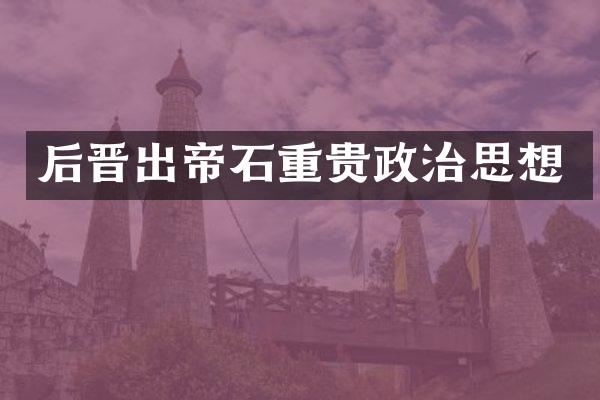后晋出帝石重贵政治思想
朝代:五代十国 | 时间:2024-04-11 | 阅读:4548次# Political Ideology of Shi Chong, the Last Emperor of Later Jin Dynasty

Introduction
Emperor Shi Chong, also known as the Last Emperor of the Later Jin Dynasty, reigned during a tumultuous period in Chinese history. His political ideology and governance style played a significant role in shaping the dynasty's final days. This article aims to delve into the political thoughts of Shi Chong and analyze how they influenced his rule.
Historical Context
During the Later Jin Dynasty, internal strife and external threats posed serious challenges to the empire. Emperor Shi Chong ascended to the throne in the midst of chaos and had to navigate complex political waters to maintain stability and authority.
Shi Chong's Political Philosophy
1. Centralized Power: Shi Chong believed in centralizing power in the imperial court to maintain control over the vast territories of the empire. His administration focused on strengthening the authority of the monarchy.
2. Confucian Values: As a Confucian ruler, Shi Chong emphasized the importance of moral governance based on Confucian principles. He promoted virtues such as filial piety, righteousness, and loyalty among his officials.
3. Meritocracy: Shi Chong advocated for a merit-based system of governance where officials were appointed based on their abilities and qualifications rather than noble lineage. This approach aimed to ensure efficiency and competence in administration.
4. Military Reform: Recognizing the significance of a strong military, Shi Chong implemented reforms to modernize and strengthen the imperial army. He invested in training, equipment, and strategic planning to defend the realm against external threats.
5. Economic Development: Understanding the importance of a stable economy for the empire's prosperity, Shi Chong initiated policies to promote agriculture, trade, and infrastructure development. He sought to improve the livelihood of the people and enhance the empire's economic resilience.
Challenges and Legacy
Despite his efforts, Emperor Shi Chong faced numerous challenges, including rebellions, invasions, and internal dissent. His reign ended with the fall of the Later Jin Dynasty, marking the transition to the Song Dynasty. However, Shi Chong's political ideology left a lasting legacy in Chinese history, influencing subsequent rulers and shaping governance practices.
Conclusion
Emperor Shi Chong's political ideology reflected a blend of Confucian values, centralized authority, meritocracy, military reform, and economic development. His governance style aimed to consolidate power, promote moral governance, and ensure the empire's stability and prosperity. While facing significant challenges, Shi Chong's legacy as the Last Emperor of Later Jin Dynasty remains a subject of historical analysis and reflection on political leadership in ancient China.
In conclusion, the political ideology of Shi Chong, the Last Emperor of Later Jin Dynasty, represents a complex tapestry of governance principles and challenges that defined his reign and influenced the course of Chinese history.
文章标签:政治思想
上一篇:唐朝戏曲艺术:中国古代戏曲的起源与发展 | 下一篇:吴仁宝
